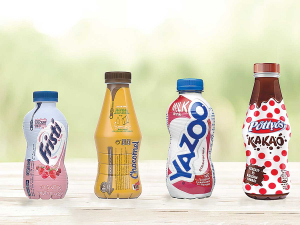Dutch co-op's profit slumps
One of the world's largest dairy co-operatives is reporting a slump in half-year profits on the back of declining commodity prices and lower sales volumes.
 FrieslandCampina have announced they will adopt the use of fully recycled products for their products.
FrieslandCampina have announced they will adopt the use of fully recycled products for their products.
One of the world’s largest dairy cooperatives is moving to 100% recycled polyethylene terephthalate (PET) bottles from next month.
FrieslandCampina, Europe’s largest farmer-owned milk processor, has also developed a new ‘zipper’ that allows consumers to easily remove wrappers from PET bottles before putting them into recycling bins.
Patrick van Baal, global director packaging development at FrieslandCampina, says with the 100% recycled PET bottle, the co-operative is taking a new step in making its packaging circular.
“Our ambition is to become fully circular…that is why we are increasing the recycled content of our PET bottles from 20% to 100%,” he says.
“This step is crucial because in order to achieve our sustainability goals, all packaging must first become recyclable and/or reusable.”
This move makes FrieslandCampina the first company in the dairy sector to make its bottles virtually circular for its brands in the Netherlands, Belgium, the United Kingdom and Hungary.
Van Baal says one of the objectives of FrieslandCampina’s sustainability programme ‘Nourishing a Better Planet’ is to make the entire packaging portfolio sustainable and to reduce the amount of packaging materials to a minimum as well.
Five years ago the co-op switched to PET for all its drinking bottles because PET can potentially be made fully circular.
Also, unlike glass, it is lightweight and has a low carbon footprint. By making all new PET bottles from old PET bottles, FrieslandCampina will reduce production of about 1.9 million kilograms of new plastic.
Van Baal says the zipper will allow consumers to easily remove the label, so the bottle can be sorted and recycled much better.
“After your bottle has been discarded, it will go to a sorting centre,” says van Baal.
“The sorting is done by machines, and when the label is still on the bottle, the machine can’t ‘see’ the bottle underneath it.
“Besides, when the bottle and the label go to the recycling factory together, the inks and the material of the sleeve will mix with the transparent bottle material, making it less transparent and lowers the quality.”
He says labels are important and not only there “to be pretty”.
“It also covers the whole bottle and in that way keeps the light out of the bottle, keeping your product fresh for longer. Without the label the product would spoil quickly and we really don’t like food waste.”
New Zealand dairy processors are welcoming the Government’s commitment to continuing to push for Canada to honour its trade commitments.
An educational programme, set up by Beef + Land New Zealand, to connect farmers virtually with primary and intermediate school students has reported the successful completion of its second year.
The Food and Agriculture Organisation of the United Nations (FAO) has welcomed a resolution adopted by the United Nations (UN) General Assembly to declare 2026 International Year of the Woman Farmer.
Waikato herd health veterinarian Katrina Roberts is the 2024 Fonterra Dairy Woman of the Year.
Trade Minister Todd McClay says New Zealand has no intention of backing down in a trade dispute with Canada over dairy products.
Horticulture NZ chief executive Nadine Tunley will step down in August.
OPINION: Canterbury milk processor Synlait is showing no sign of bouncing back from its financial doldrums.
OPINION: It seems every bugger in this country can get an award these days.